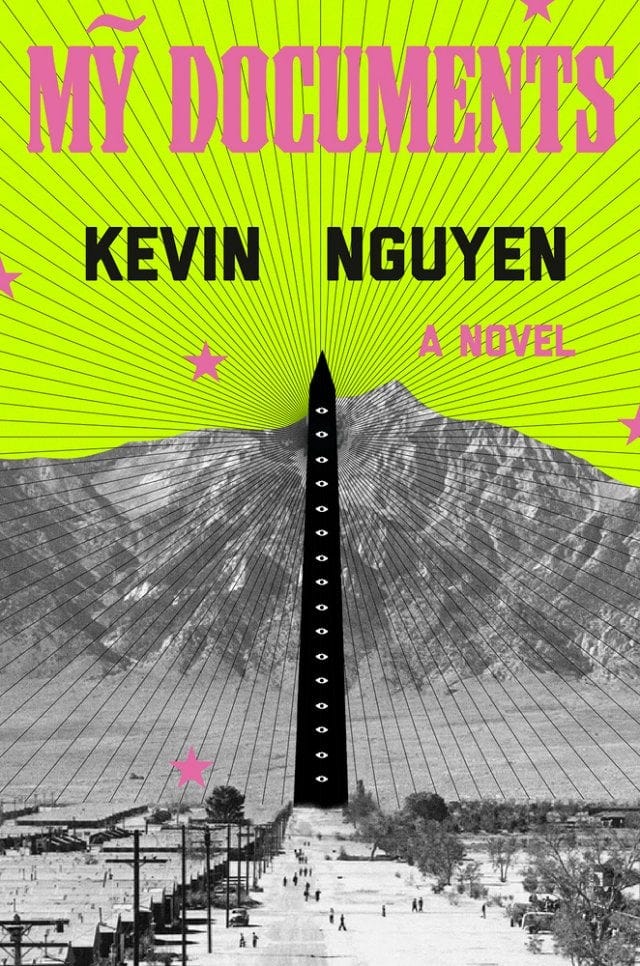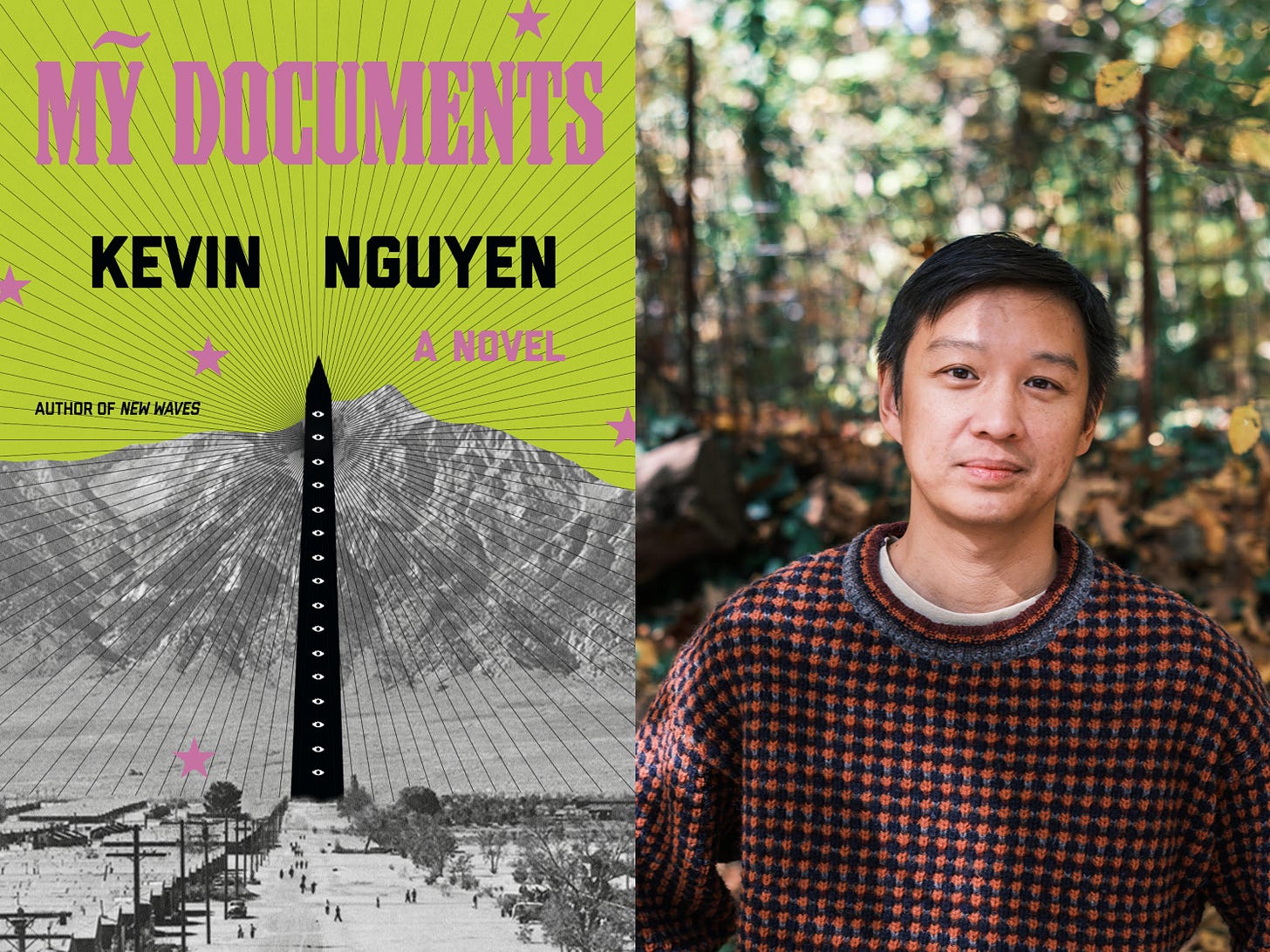Processing: How Kevin Nguyen Wrote Mỹ Documents
The author on grounding fiction in history, writing while having a full-time job, and being “as generous or cruel as you want to your characters.”
On a semi-regular basis, I interview authors about their writing processes and the craft behind their books. You can find previous entries here. This week, I’m excited to be talking to Kevin Nguyen about his excellent and eerily prescient sophomore novel, Mỹ Documents, which came out today. The novel follows four cousins whose lives are upended after a series of bombings leads to the U.S. government creating internment camps for Vietnamese Americans. Jen and Duncan are sent to Camp Tacoma while Ursula and Alvin manage to avoid detainment. The novel follows the four characters over the course of several years as they struggle, thrive, hope, and dream in their different situations. Throughout these chapters, Nguyen includes reported pieces that build out the world of the novel. The book is filled with sharp satire—e.g., an article called “These People Are Review-Bombing Detention Camps on Google Maps—And It’s Giving Us Life” perfectly skewers ineffective social media activism as well as clickbait web content—but is also a loving look at family, creativity, and surviving in dark times.
I talked to Nguyen over email about grounding fiction in history, writing while having a full-time job, and being “as generous or cruel as you want to your characters.”
Since this interview series is called “processing,” it seems appropriate to start by asking you about your writing process. You’ve talked before about drafting your first novel, New Waves, with the Notes app on your cellphone. It’s common wisdom, but in my experience true, that each novel teaches you how to write it and the process can change each time. How did your process change with Mỹ Documents? What lessons carried over and what did you have to do differently?
I wasn’t aware of that common wisdom because I struggled to start this one. Basically, I thought I could write Mỹ Documents the same way I wrote New Waves and discovered that I had to completely change my approach—because this story had more plot, I needed to do a lot more planning with outlines and character sketches; I used to write in the morning but this time I could only get things on the page late at night; writing on my phone wasn’t working anymore so I did do a lot of drafting on an iPad, which I suppose is like writing on a slightly larger phone.
Honestly, I was frustrating myself at the beginning, but finding my way through and realizing I needed new habits and rhythms to write was pretty satisfying in the end. Part of the work is figuring out how to work.
One thing that stood out to me is the tonal balance you strike. Mỹ Documents involves a dark and dystopian premise: Vietnamese Americans are interned in camps similar to Japanese internment during WWII. While the book doesn’t shy away from the horrors, much of the focus is on the daily lives of the characters. Their joys, irritations, jokes, and projects. There’s a lot of darkness but also a lot of light and humor. How did you approach the tonal balance of the book?
That balance was something I wanted to nail pretty early on because that tension between the book’s heavy themes and its sense of humor was as important to me as the central tensions between the characters. The driving idea behind Mỹ Documents is that even in bleak circumstances, people still find ways to adapt, to laugh. The characters in camp create art or tell stories as a means of survival; they crack jokes because that’s how people internalize the world. I found that in my research, our understanding of history—whether it’s Japanese internment, the Vietnam War, the current state of migrant detention in the US—this part of humanity is erased in lieu of pure despair. Maybe in nonfiction, it might seem insensitive or distracting to take that angle with your subjects; in fiction, you can be as generous or cruel as you want to your characters.
I called the novel “dystopian”, and I imagine many reviews will too. But “dystopian” can imply an imagined alternative world and your novel is heavily informed by actual history and, well, the state of things that we see on the news every day. Did you think of the novel as “dystopian” while writing? And were there works of dystopian literature that influenced you?
I don’t think “dystopian” is the wrong term—I’ve also had people call the book speculative fiction, or in some cases, science fiction—but these are not the words I would use. The set up of the novel is very grounded in history and our current reality. There’s not some fantastical element I’ve invented that creates the scenario of the novel. It’s a single policy, just as it took a single executive order for Franklin D. Roosevelt to incarcerate an entire ethnic group. Even if you believe the US would never repeat its mistakes of the past (which lol), we are always only one piece of legislation away — and the underlying act has already been evoked by our current president.
Something that rang very true in the novel was the depiction of how Silicon Valley capitalism and the internet warp our politics and lives. I’m thinking of the way Alvin is spared the camps because he works for Google and large corporations can opt out of the law. Or how people protest by “review bombing” detention camps, which is then is turned into online clickbait content: “These People Are Review-Bombing Detention Camps on Google Maps—And It’s Giving Us Life.”
I imagine a lot of these moments were influenced by your own history working in the tech world and covering the tech world as an editor and journalist?
Yeah, I have the odd background of working in tech and then making the leap to journalism, instead of the other way around. (Even though I am a lot more accomplished as a journalist than I ever was as a low-level tech worker, the decision still confounds my parents.) What I saw at big Silicon Valley-based companies was an embrace of progressive values that were either naive in a dramatic way or disingenuous in a sinister way. If mainstream media seeks to speak truth to power, it similarly does always reckon with the manner with which it wields power itself.
I didn’t put many real-life things into the book, but the ambiguities of these work environments felt like rich territory for a novel to explore. It was fun to imagine how these things could be exploited by people who are less moral and more power-hungry than myself.
The novel has a roving POV structure that moves between siblings—some who are interned in the camps and some who are not—and these are interspersed with news articles and other reportage pieces. It’s very effective in keeping the narrative moving and also giving us a wider scope. Was the structure something you planned going into the novel or did it come about during the drafting? Did you outline at any point?
I knew with four alternating POV characters with their own arcs that the chapters needed to be short. Since my last book, I’d done a bit of TV writing/development and really recognized how well that sparseness and economy works mechanically as a plot driver. Have you ever read Understanding Comics by Scott McCloud? He talks about how the magic of comics is in the space between panels—“the gutters.” What the reader puts together in the gutters, the narrative leap they make between frames, is the most powerful part of the medium. I thought a bit about how what I didn’t show between chapters could sustain narrative tension. The characters are disconnected in the book, since some are in camp and others are outside of it. I wanted their actions to affect each other, often unknowingly, but give the reader space to make those connections.
An earlier draft was about 30,000 words longer. You’ll appreciate this Lincoln—I removed a lot of world-building. I wanted the book to be focused on its characters, rather than its environment.
You mention two nonfiction works that influenced the book in your acknowledgement. How did you approach research for this novel? Did the research come first or during revision? Both?
I’d been reading about Japanese incarceration on and off since college, and the most prominent books tended to be memoirs. With Vietnam War books, which I was diving into more recently, I couldn’t stand the icy remove of the ones about American politics or military tactics, so I opted for journalists’ memoirs about reporting from the frontlines. I found that despite being many decades apart, these firsthand accounts had the familiar strengths and weaknesses. They possessed a more complete emotional picture than a traditional history book; at the same time, the voices sometimes came across as self-serving or incomplete or both. Mỹ Documents deals with the struggle to learn certain parts of history, and a lot of that has to do with the overconfidence of history books, the limitations of memoir, and the incentives of journalism.
Even today, Japanese incarceration is rarely taught in schools; meanwhile, the Vietnam War continues to be reduced to its American perspective. Apple put out a multi-part documentary earlier this year called Vietnam: The War That Changed America, the title of which reflects exactly that problem. Apparently we’re still doing this in 2025!
Lastly, as someone who works a demanding full-time job and still manages to write novels, do you have any advice for readers on balancing work and art?
Having a full-time job really compresses the amount of time I have to write, so I really try to take advantage of the space I do have. Honestly, I just work all the time. There aren’t really any ways around this, at least none that I’ve found. But I do think my productivity comes in bursts, so whenever I’m in a time where my writing momentum is strong, I cancel all my plans and focus on grasping that for as long as it lasts. And when those spurts end, I try to relax as much as possible and have the confidence that another creative burst will come back at some point.
Like I said earlier, the work is figuring out how to do the work, and then I guess, doing it as much as possible until you can’t. I mean this very unromantically. Writing and publishing is a privilege—I never want to take that for granted.

If you enjoy this newsletter, consider subscribing or checking out my recent science fiction novel The Body Scout—which The New York Times called “Timeless and original…a wild ride, sad and funny, surreal and intelligent”—or preorder my forthcoming weird-satirical-science-autofiction novel Metallic Realms.




Sounds like an amazing story. Thanks for introducing me to Kevin 🙌
Well, this is on the list to read now! Also super cool to see another author with an additional full time job, makes me feel like I can pull it off!